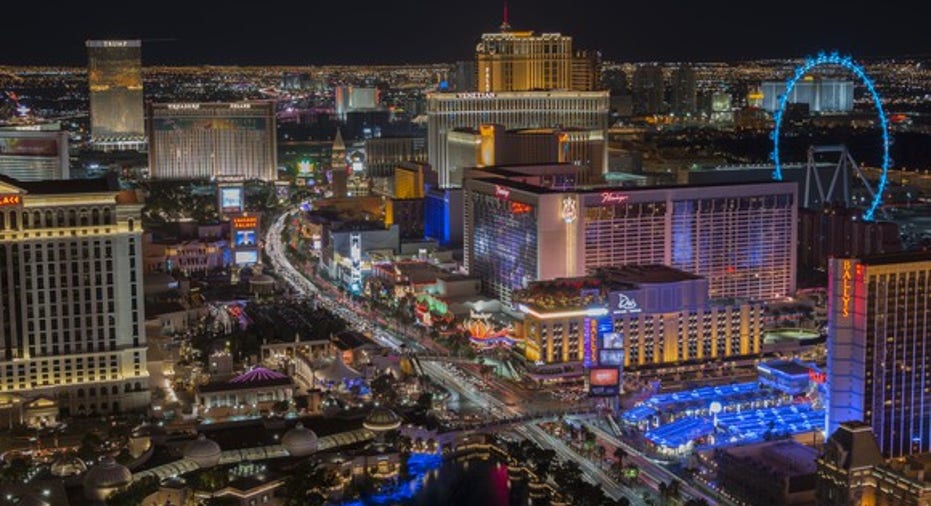The Latest Money Grab in Las Vegas

When MGM Resorts (NYSE: MGM) launched a parking fee on the Las Vegas Strip earlier this year, you knew it was a matter of time before competitors followed. Now Caesars Entertainment (NASDAQ: CZR) has just announced its "improved parking experience," which includes new fees for self parking and valet.
The fees are now going to be a standard on the Las Vegas Strip, and that's a shift in the way consumers will view visiting a resort. But it's more a sign of the times than anything else.
Image source: Getty Images.
The growing parking fees in Las Vegas
Of course, gaming companies are trying to sell parking fees as an enhancement to customers. Caesars' executives said in a press release that customers were complaining that parking was scarce, so the solution was charging for parking. Don't be fooled, though: this is just an additional revenue source for Caesars.
Fees weren't announced at Caesars, but they'll likely be comparable to those of MGM Resorts. Self-parking is $8 per day at Monte Carlo, Luxor, and Excalibur, while other resorts are $10 per day. Valet fees range from $13 to $18 per day.
This may be a shift in how customers, particularly locals, view going to the Las Vegas Strip. But it's part of a long-term trend of pay for play.
The real money is off the casino floor
Casinos used to be built on the back of the casino floor, but that's slowly changed as megaresorts have taken over the Las Vegas Strip. Hotel rooms, restaurants, shopping, and high flying shows now generate over half of the revenue on the Las Vegas Strip. The casino can no longer subsidize everything else at a resort.
That's why we saw the advent of the resort fee, which rapidly spread across the Strip. It was a way to squeeze more money out of customers who wanted to enjoy the trappings of Las Vegas but maybe didn't want to gamble.
Charging for parking is another extension of this desire to make money off amenities that used to be free but were subsidized by the casino. Now, it'll become the norm to pay for things that used to be attractions used to draw people to the casino.
Charging for what used to be free
Expect this trend of fees for entertainment or amenities that used to be free to continue. When Steve Wynn built Bellagio, Mirage, and Treasure Island he included entertainment features out front that were intended to draw people into the resort. In the process, he created some of the most iconic -- and free -- entertainment in Las Vegas.
But as Wynn Resorts (NASDAQ: WYNN) built Wynn Las Vegas and considered expansion plans, it started to wall off entertainment. The Lake of Dreams isn't a direct fee, but you have to enter the resort to see it and it's built to entertain guests at Wynn's restaurants. When Steve Wynn announced the potential $1.5 billion Paradise Park expansion on the back side of the hotel he said a $20 or $30 fee would be included just to get in. This walls off entertainment to paying guests instead of giving it away for free, and the potential revenue addition is about $110 million per year.
Any time a resort gets to charge for something customers value, they'll do so -- that's the new reality in Las Vegas. There are no freebies. You pay for what you get. Welcome to the new Las Vegas Strip.
10 stocks we like better than Caesars Entertainment When investing geniuses David and Tom Gardner have a stock tip, it can pay to listen. After all, the newsletter they have run for over a decade, Motley Fool Stock Advisor, has tripled the market.*
David and Tom just revealed what they believe are the 10 best stocks for investors to buy right now... and Caesars Entertainment wasn't one of them! That's right -- they think these 10 stocks are even better buys.
Click here to learn about these picks!
*Stock Advisor returns as of November 7, 2016
Travis Hoium owns shares of Wynn Resorts. The Motley Fool is short Caesars Entertainment. Try any of our Foolish newsletter services free for 30 days. We Fools may not all hold the same opinions, but we all believe that considering a diverse range of insights makes us better investors. The Motley Fool has a disclosure policy.



















